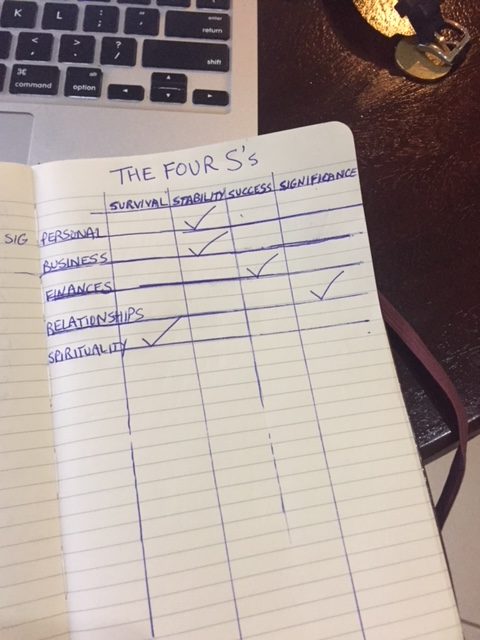When I was 23 years old, I attended a seminar on how to be a successful salesperson that I paid $499 to attend.
While that may not sound like a huge chunk of money, for me, $499 amounted to one week’s pay—if I made a sale.
I wasn’t entirely naïve—I did have the foresight to view the money as an investment in myself. But if I’m being honest, I kind of thought “the main guy” at the seminar would give me secrets to success.
I felt like I’d been ripped off after day one of a two-day seminar.
The guy oozed success—charismatic, well-spoken, wore a custom suit—that wasn’t the problem. My issue was the guy mostly just told stories. There were no “secrets” that would lead to my success.
The next morning he shared his background: first-generation American, son of a day-laborer. He had an up-and-down relationship with his parents. He once went years without talking to his dad. I had a similar story and was intrigued. Even took a few notes.
By lunchtime, something clicked. And I started to “get it.” He was probably 35 but wise beyond his years. What I realized was he had been weaving in his philosophies of life (read mine here) through anecdotes & stories.
He closed the seminar with an exercise he said would take five minutes.
He said, “I promise, if you will do this exercise periodically, you will achieve ‘next-level success’ in your life & business. Are you ready?”
By this time I was like a teenie-bopper at a “Taylor” concert, hanging on every word. I said, “Yeaah!” with everybody else.

The exercise he called “life-changing” seemed simple. When we finished, I put my pen down, looked up and thought Success isn’t complicated—it’s just a matter of focusing on what’s important.
Becoming Successful in What’s Important
Before I start with what’s important, I’d be remiss if I didn’t acknowledge the role that talent, luck, hard work, and being in the right place at the right time plays in anyone’s success, mine included. I don’t know how those percentages work out. No one does. All I can do is share with you a few of my conscious strategies within the context of many embarrassing rejections and failures (for future blog posts) that led to my success.
“The tragedy is that much of what you think is random is in your control, and what’s worse, the opposite.” – Nassim Taleb
There’s no formula for success because there’s too much randomness in life. I hope the right answer for you is a combination of actions you’re already taking, and “secrets” you steal from this blog.
They’re secrets I’ve likely stolen from someone else, so as they say where my family is from in New Orleans, “start lootin’!”
Just kidding. In NOLA they say, “Who Dat!”
Here’s the exercise I learned at the smooth-talker’s seminar 16 years ago.
He asked us to take out pen and paper. He said to think of five categories of life that are important (to us personally), scribble a few notes on why those aspects of life are important, and write them down the left side of the page, as follows:
- Personal – time management, habits, mindset, emotional intelligence
- Business – relationships, service to others, communication, growth
- Finances – income up, expenses low, strict budget, save automatically
- Relationships – invest time, seek depth, encourage & inspire
- Spirituality – wisdom, gratitude, relationship with God
He told us to underline each category, and allow the underline to go across the page.
Then across top of page, he instructed us to write what he called The Four S’s, and make columns with lines between them:
- Survival
- Stability
- Success
- Significance
When done, the page looked like an Excel spreadsheet with 20 empty cells (4×5). He asked us to check the “cell” for each category we’d listed (Personal, Business, Finances, etc.), which corresponded to the appropriate “S” above.
For example, since I’d just graduated from college, worked a commission-only job and wasn’t sure how I would afford living expenses, for “Finances” I checked “Survival.”

All organisms require periods of growth and equilibrium, we humans included. So it’s important you revisit this exercise. Your goal is to check the next-level “S”—the “cell” to the right of your current “S”—the next time you do the exercise. For example, if you’re in Survival mode, your goal is to get to Stability.
How you define each “S” is up to you.
Do I Consider Myself Successful?
Let me step back a minute to tell you what prompted this article. A gal asked me recently if I consider myself “successful.” It’s one of those questions where I think How much time you got?
Sometimes when faced with a question I think requires a nuanced response, I start my answer and watch peoples’ eyes glaze over. They’ll say, “It’s a yes or no question, bro.”
Most people are looking for a meme or a tweet, not a conversation or dialogue. However, Man O is for bros who want more.
Incidentally, the gal’s question is one I’ve asked myself many times, though not in the same way. Here’s what she said:
“I know that you have achieved FIRE [Financial Independence Retire Early] at a young age, but I am curious whether you view yourself as successful? If so, what was the key to your success. If not, when will you be “successful?”
See what I mean? Not easy. On December 31 every year, I do the “4-S” exercise in my journal. I’ve been doing it for 16 years.
I’ve also taught the exercise to small groups, and mention it when giving talks. If anyone is taking notes in the audience (it’s rare), I encourage them to borrow the exercise and make it their own.
If I may continue to dodge the girl’s question, another thought that encouraged this post is that most people don’t have a friend they can ask about tools they’ve used to help them achieve success. Even if they had such a friend, they wouldn’t ask. It’s an awkward conversation at a Bounce House birthday party.
What I bring to the party is a willingness to write about awkward but helpful topics.
Keep Your Life, Your Life
The 4-S exercise is a reminder that it’s your journey. That is, the exercise is personal, not relative. You’re comparing yourself to the person you were last time you did the exercise, not who someone else was or is now. Besides, you have no idea where they are spiritually or financially, or whether those categories are even important to them.
You’ll reduce your chances of checking the next “S” if you’re worried about others’ filtered lives on Facebook & Instagram. It’s your journey. If you’ve been guilty of social media comparisons in the past, get used to not caring who goes to Greece or how much other parents spend on their kid’s birthday party. None of it matters.
Be tolerant with others and strict with yourself. – Marcus Aurelius
While an accountability partner might help to keep you on track, or call bullsh*t on your inflated sense of self, the 4-S exercise is intended to be a self-assessment. Only you will know whether you’ve moved from “Stability” to “Success” in your finances i.e. reduced debt or stayed within your monthly budget.
You must determine where you are, so that you can get to where you want to be. Nobody holds you to a higher standard than you hold yourself—make it a rule.
Busy is the New Stupid
Most successful people have an ability to observe themselves and objectively monitor their progress. It’s a meta-skill that anyone can acquire. If you’re still boasting about how busy you are, but don’t understand yourself, you’ve set yourself up for stagnation in all major areas of life.
“Busy is the new stupid.” – Bill Gates
The 4-S exercise requires solitude. You must take time out of your busy schedule for introspection, and reflect on what’s important. You’ll begin to absorb information about yourself and the world around you like a sponge.
Good ideas for how to be successful are simple ones. Use the exercise I’ve outlined as a tool to observe your life—it will enable you to make better interpretations of occurrences and circumstances in your own mind. In the process, you’ll become a student of your own life. It’s a secret to success I learned at a two-day seminar all those years ago—hard to believe I paid less than $500 to attend.



